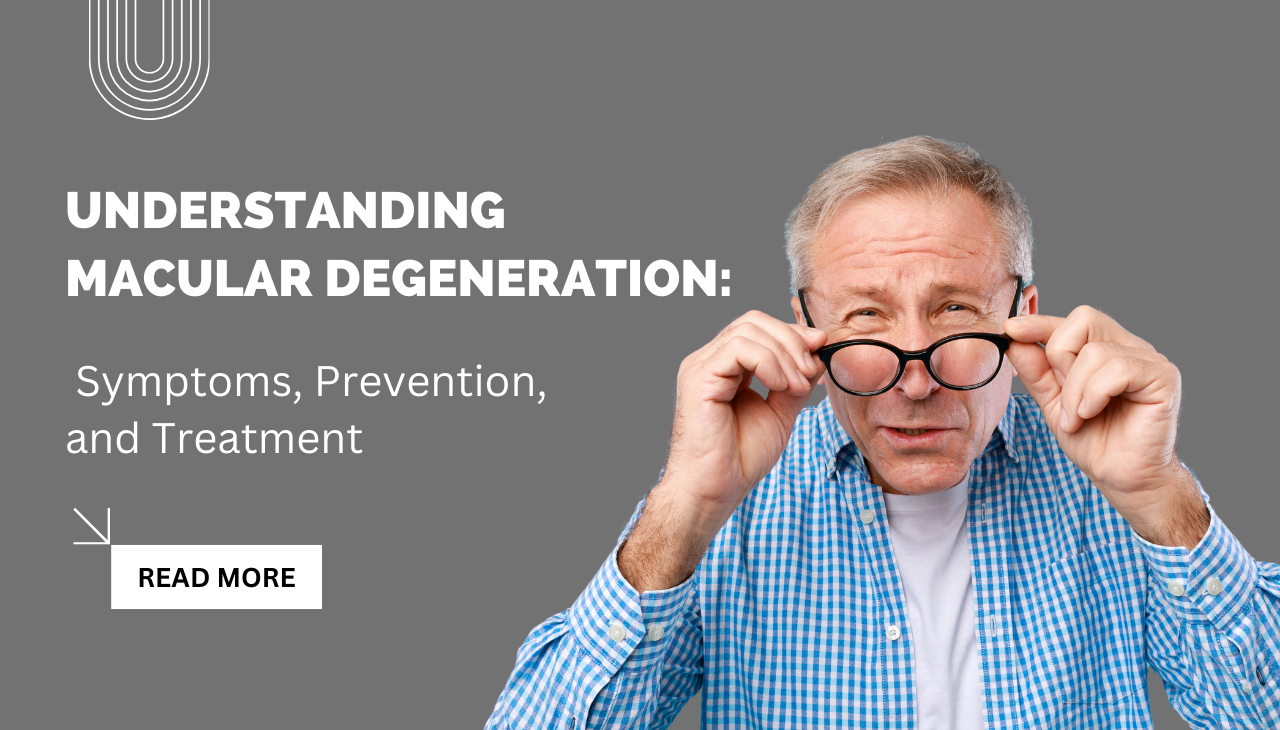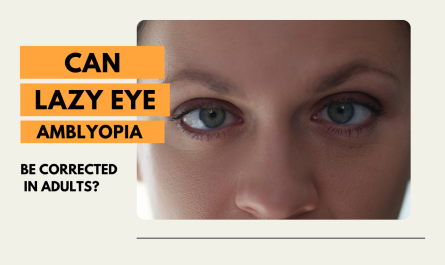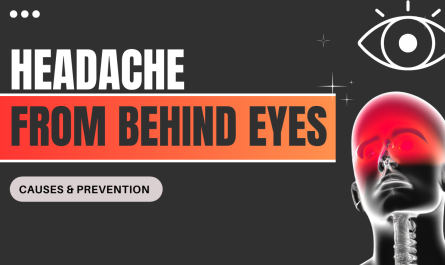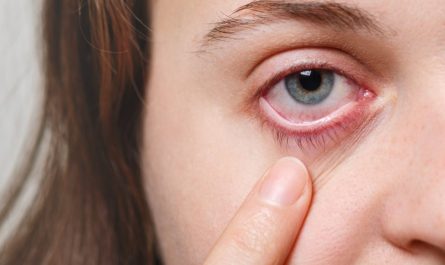The human eye is an intricate organ, and the macula—a small central part of the retina—plays a vital role in sharp, detailed vision. Macular degeneration is a condition that affects the macula, leading to vision loss and significantly impacting quality of life. Understanding this condition is crucial for early detection and management.
This blog explores the symptoms, prevention strategies, and treatment options for macular degeneration, empowering you with the knowledge to protect your vision.
What is Macular Degeneration?
Macular degeneration, also called age-related macular degeneration (AMD), is a progressive eye condition that damages the macula, the part of the retina responsible for central vision. It commonly affects older adults and is a leading cause of vision loss globally.
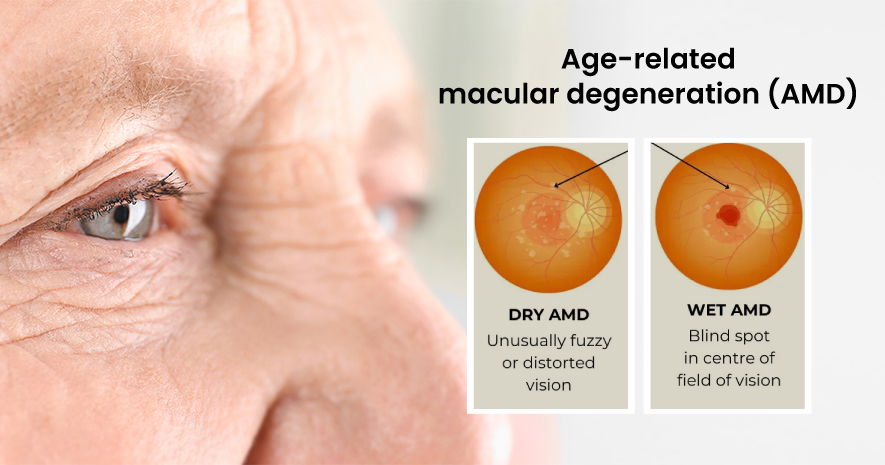
Types of Macular Degeneration:
- Dry AMD:
- The more common form, accounting for about 80-90% of cases.
- Characterized by the thinning of the macula and the accumulation of small yellow deposits called drusen.
- Progresses slowly over time.
- Wet AMD:
- Less common but more severe.
- Occurs when abnormal blood vessels grow beneath the retina, causing fluid or blood leakage.
- Progresses rapidly and requires immediate attention.
Symptoms of Macular Degeneration
Macular degeneration often develops gradually, making early detection crucial. Common symptoms include:
- Blurry or distorted vision: Straight lines may appear wavy.
- Difficulty reading or recognizing faces: Loss of sharp central vision.
- Dark or empty areas in vision: Central blind spots that grow over time.
- Reduced color perception: Colors may appear less vivid.
- Need for brighter lighting: Difficulty seeing in low-light conditions.
If you experience any of these symptoms, consult an ophthalmologist promptly for a comprehensive eye examination.
Risk Factors for Macular Degeneration
Understanding the risk factors can help in early identification and prevention:
- Age: The risk increases significantly after age 50.
- Family History: A genetic predisposition to AMD may exist.
- Smoking: Smoking doubles the risk of developing AMD.
- Diet and Lifestyle: Poor nutrition and lack of exercise contribute to AMD progression.
- Obesity and High Blood Pressure: These conditions increase the likelihood of wet AMD.
- Sunlight Exposure: Prolonged UV exposure can harm the macula.
Prevention of Macular Degeneration
While some risk factors like age and genetics are beyond control, adopting a healthy lifestyle can reduce the likelihood of developing AMD or slow its progression:
- Healthy Diet:
- Include leafy greens, citrus fruits, nuts, and fish rich in omega-3 fatty acids.
- Antioxidants like vitamins C, E, and zinc support eye health.
- Avoid Smoking:
- Quitting smoking significantly lowers AMD risk.
- Protect Your Eyes:
- Wear sunglasses with UV protection to shield your eyes from harmful rays.
- Exercise Regularly:
- Physical activity promotes healthy blood circulation, benefiting the retina.
- Regular Eye Check-Ups:
- Early detection through routine eye exams is key to managing AMD effectively.
Treatment Options for Macular Degeneration
While there is no cure for macular degeneration, treatments can slow its progression, particularly for wet AMD:
1. Dry AMD:
- Nutritional Supplements: The AREDS (Age-Related Eye Disease Study) formula, a combination of vitamins and minerals, may slow the progression of advanced AMD.
- Lifestyle Changes: Adopting a healthy diet and quitting smoking can help manage the condition.
2. Wet AMD:
- Anti-VEGF Injections: Medications like ranibizumab, aflibercept, or bevacizumab block the growth of abnormal blood vessels and reduce leakage.
- Photodynamic Therapy (PDT): A laser treatment that destroys abnormal blood vessels.
- Laser Surgery: High-energy lasers seal leaking blood vessels, though this option is less commonly used today.
Low Vision Aids:
- Devices like magnifiers and specialized glasses can help individuals with advanced AMD maintain some level of independence.
Living with Macular Degeneration
Living with AMD can be challenging, but several resources and strategies can improve quality of life:
- Rehabilitation Services: Training programs help adapt to vision changes.
- Support Groups: Connecting with others facing similar challenges can provide emotional support.
- Assistive Technology: Screen readers, audio books, and voice-controlled devices can ease daily tasks.
Consult Laxmi Eye Hospitals for Expert Care
If you’re concerned about macular degeneration, trust the expert ophthalmologists at Laxmi Eye Hospitals for accurate diagnosis and advanced treatment. With state-of-the-art facilities and compassionate care, Laxmi Eye Hospitals are at the forefront of managing AMD effectively.
Branches: Located in Dombivli, Panvel, Kharghar, Kamothe, Laxmi Eye Hospitals serve patients across Mumbai and Navi Mumbai, ensuring convenient access to world-class care.
Book your consultation today to safeguard your vision and receive personalized care tailored to your needs.
Conclusion
Macular degeneration is a serious condition that requires awareness, early detection, and timely intervention. By understanding its symptoms, adopting preventive measures, and exploring available treatments, individuals can preserve their vision and quality of life.
India’s top eye care facilities, including Laxmi Eye Hospitals, are equipped to provide comprehensive care for AMD, ensuring better outcomes for patients. Don’t wait—take the first step toward protecting your vision today.

